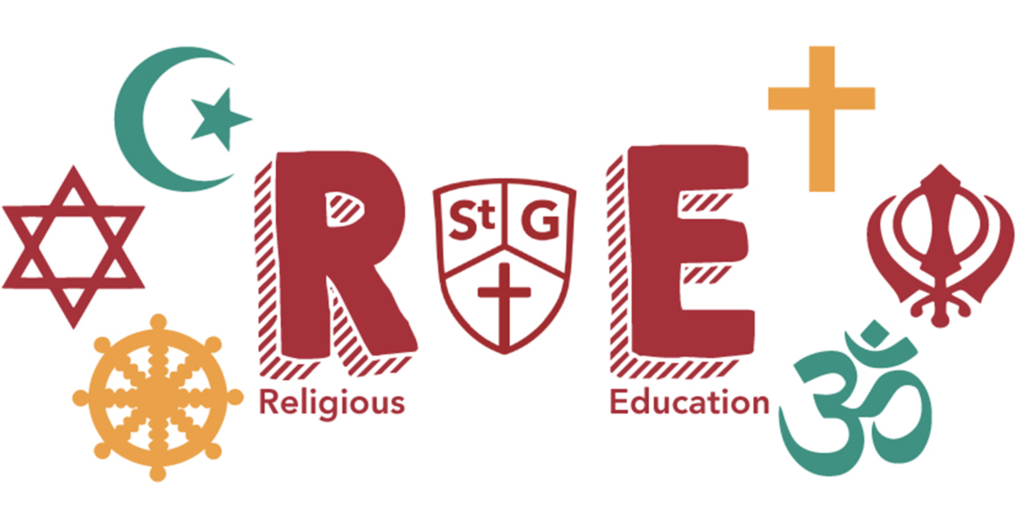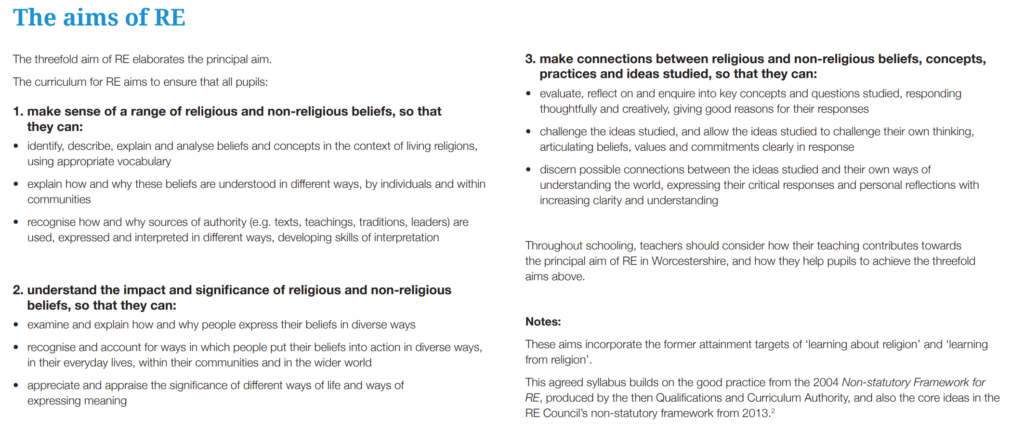
Intent
The principle aim of RE at St George’s is to engage pupils in systematic enquiry into significant human questions which religion and worldviews address, so that they can develop the understanding and skills needed to appreciate and appraise varied responses to these questions, as well as develop responses of their own. The children will learn about and understand a range of religions and worldviews. They will be encouraged to express ideas and insights about nature, significance and impact of religions and worldviews. They will gain and deploy skills needed to engage seriously with religious and worldviews.
At St George’s School we make RE lessons an enjoyable experience. In Early Years the children will learn about Christianity and other faiths as they learn about themselves. As the children move into Key Stage One they will learn about Christian and Muslim traditions. In Key Stage Two the children will continue to learn about Christian and Muslim traditions but will also learn about Hindu and Jewish traditions.
Implementation
Daily Collective Worship is an important element of the school day. The school has close links with the local church and attends the church for Harvest, Christingle and Easter services. Members from St George’s church lead acts of worship fortnightly. This year the school will celebrate Christmas with the other schools within the MAT at Worcester Cathedral.
RE is an important aspect of the curriculum as we are a church school. The curriculum follows the Worcestershire Agreed Syllabus.
This year there is a focus on the introduction of the ‘Understanding Christianity’ and weaving the content into the Worcestershire Agreed syllabus.
Drama is used in RE to help the children understand the stories from different faiths.
Worcestershire Agreed Syllabus 2020-2025
As a school, we are using the new Worcestershire Agreed Syllabus 2020-2025. The Worcestershire Agreed Syllabus 2020 asserts the importance and value of religious education (RE) for all pupils, with on-going benefits for an open, articulate and understanding society.
The following purpose statements underpin the syllabus, which is constructed to support pupils and teachers in fulfilling them:
• Religious education contributes dynamically to children and young people’s education in schools by provoking challenging questions about meaning and purpose in life, beliefs about God, ultimate reality, issues of right and wrong and what it means to be human.
• In RE pupils learn about religions and beliefs in local, national and global contexts, to discover, explore and consider different answers to these questions.
• Pupils learn to weigh up the value of wisdom from different sources, to develop and express their insights in response and to agree or disagree respectfully.
• Teaching therefore should equip pupils with systematic knowledge and understanding of a range of religions and beliefs, enabling them to develop their ideas, values and identities.
• RE should develop in pupils an aptitude for dialogue so that they can participate positively in our society, with its diverse religions and beliefs.
• Pupils should gain and deploy the skills needed to understand, interpret and evaluate texts, sources of wisdom and authority and other evidence.
They should learn to articulate clearly and coherently their personal beliefs, ideas, values and experiences while respecting the right of others to differ.
The purpose of RE is captured in the principal aim, which is intended to be a shorthand version for day-to-day use. It should be considered as a doorway into the wider purpose articulated above.
Principal aim
The principal aim of religious education is to explore what people believe and what difference this makes to how they live, so that pupils can gain the knowledge, understanding and skills needed to handle questions raised by religion and belief, reflecting on their own ideas and ways of living.
Schools should make use of this principal aim throughout their planning to ensure that all teaching and learning contributes to enabling pupils to achieve this aim. Schools and RE departments will find that discussing how the principal aim relates to the purpose of RE, and talking about how classroom RE can contribute to the aim, will be helpful for teachers in
clarifying what RE is for in their school and classroom.
Worcestershire Agreed Syllabus 2020-2025



